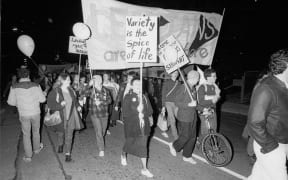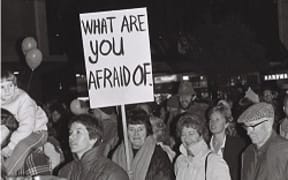Men with historical homosexual convictions may be retraumatised by having to go through a formal process to have their convictions quashed, Rainbow Wellington says.

Photo: Creative Commons/Ludovic Bertron
Parliament decriminalised consensual sex between men aged 16 and over in 1986, but convictions for those offences before that time remained on record and can appear in criminal history checks.
Justice Minister Amy Adams yesterday apologised for the hurt and the distress those men had suffered saying she hoped her plan would go some way toward addressing that.
Ms Adams' proposal will set up a scheme where affected men can apply to the Secretary of Justice to have their convictions quashed.
But Rawa Karetai, who chairs Rainbow Wellington, a group representing LGBTQI rights, said some of the men had suffered so much that it may be retraumatising for them to have to go through the application process.
He said a better approach would be to hold a systemic review of all the historical convictions.
"The stigma that some of the people have been living with with these crimes, means that they've tried to push them to the back of their mind, they'd had to go off and do other jobs as they [couldn't] go down the career path that they wanted to do.
"They're still living with the fears of the stigma so we're basically wanting to make sure that they don't even have to readdress them."
Mr Karetai said many of the men simply did not want to talk about what they had been through.
"Some people will, but the reality is that a lot of people during the campaign weren't even comfortable to share their experiences and it was very hard to even get people to the select committee or to talk publicly about their convictions."
But Ms Adams said the intention was not to make the process onerous at all.
"We want it to be as simple, as light touch [as possible]... no cost to the applicant and in most cases where you can show that they were two consenting adults, over 16, the process will be very straight-forward as that is the only question the Secretary [of Justice] has to answer."
It was the former Labour MP Fran Wilde who championed the 1986 Homosexual Law Reform Act.
She said the convictions could not really have been quashed at the time.
"It has taken a long time, but quite honestly I don't think New Zealand would have been ready for this at that time.
"We were so focused on just changing the law to stop it happening that the idea of taking this move simply wasn't on the cards, and frankly I'm not sure it would have got through Parliament then anyway."
'We are ready to take this additional step'
Wiremu Demchick organised the petition that was presented to Parliament last year, prompting the Justice Minister to look into the situation.
He said it was hard to comprehend how far things had come for the gay community in the past 30 years, and Ms Adams' announcement was another massive step forward.
"I mean obviously it would have been better if the law reform had happened further back than it had, and if this had happened even further back as well, but I think what's really important is that the time has come that we are ready to take this additional step."
The government intends to introduce legislation to set up the scheme before the House rises for the general election.
Once it is in place, decisions will be made by the Secretary of Justice on a case by case basis, without the need for formal court hearings or for applicants to appear in person.






